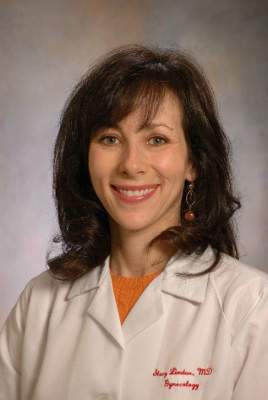User login
Though most men and women are willing to discuss sexual issues with a doctor, very few patients were counseled about sexual activity in the month following acute myocardial infarction, according to results of the Variation in Recovery: Role of Gender on Outcomes of Young AMI Patients (VIRGO) study, published Dec. 15 in Circulation.
Just 12% of women and 19% of men discussed sex with their physician after AMI, though 84% of women and 91% of men said they were comfortable having such a conversation with their doctor, reported Dr. Stacy Tessler Lindau of the University of Chicago, and her associates.
“Our findings indicate that U.S. and Spanish physicians rarely counsel younger AMI patients, especially women, about resuming sexual activity even though the large majority of these patients were sexually active in the year before their event, valued sexuality as an important part of life before and after AMI, and felt it was appropriate for physicians to initiate discussion of sexual matters in the context of AMI care,” the authors said in the report (Circulation 2014 Dec. 15 [doi:10.1161/circulationaha.114.012709]).
Dr. Lindau and colleagues recruited 2,349 women and 1,152 men in the United States and Spain who were hospitalized for AMI during August 2008–January 2012. Patients were between 18 and 55 years of age. In-person interviews were conducted during hospitalization to collect data on partner status, sexual activity, and sexual attitudes. Follow-up was conducted 1 month later via phone interviews and included questions about sexual activity, attitudes, function, and physician counseling.
Overall, 12% of women and 19% of men had discussed sex with their physician. Sexual activity at baseline significantly increased the likelihood of having the discussion: 15% of sexually active women, compared with 4% of sexually inactive women had the discussion, and 20% and 8% of men, respectively, said they had discussed sex with their physician. In the United States, most discussions were initiated by the patient, whereas in Spain, the doctor more frequently initiated the discussion, a statistically significant difference.
Among patients whose doctor issued restrictions on sexual activity, 35% were advised to limit sex, 26% to take a passive role, and 23% to keep heart rate down.
Female sex was significantly associated with no counseling (relative risk, 1.07), as was older age (RR, 1.05) and sexual inactivity at baseline (RR, 1.11). Women in Spain were significantly more likely than women in the United States to be advised to restrict sexual activity (RR, 1.36).
Guidelines from the American College of Cardiology, American Heart Association, and European Society of Cardiology all recommend that physicians counsel patients about sexual activity, and that sex can be resumed as long as the patient is able to tolerate mild to moderate physical activity.
“Physicians could meaningfully narrow the gap between guidelines and practice by adding permission to resume sex to routine counseling about returning to work and exercise,” the authors said. Using patient-centered tools to incorporate this into practice “could help improve outcomes and quality of life for younger women and men with AMI,” they added.
The study was supported by grants from the National Institutes of Health and the Fondo de Investigacion Sanitaria del Salud Carlo III. The authors disclosed relationships with Medtronic, UnitedHealth, AstraZeneca, Bayer, and numerous other pharmaceutical companies.
Though most men and women are willing to discuss sexual issues with a doctor, very few patients were counseled about sexual activity in the month following acute myocardial infarction, according to results of the Variation in Recovery: Role of Gender on Outcomes of Young AMI Patients (VIRGO) study, published Dec. 15 in Circulation.
Just 12% of women and 19% of men discussed sex with their physician after AMI, though 84% of women and 91% of men said they were comfortable having such a conversation with their doctor, reported Dr. Stacy Tessler Lindau of the University of Chicago, and her associates.
“Our findings indicate that U.S. and Spanish physicians rarely counsel younger AMI patients, especially women, about resuming sexual activity even though the large majority of these patients were sexually active in the year before their event, valued sexuality as an important part of life before and after AMI, and felt it was appropriate for physicians to initiate discussion of sexual matters in the context of AMI care,” the authors said in the report (Circulation 2014 Dec. 15 [doi:10.1161/circulationaha.114.012709]).
Dr. Lindau and colleagues recruited 2,349 women and 1,152 men in the United States and Spain who were hospitalized for AMI during August 2008–January 2012. Patients were between 18 and 55 years of age. In-person interviews were conducted during hospitalization to collect data on partner status, sexual activity, and sexual attitudes. Follow-up was conducted 1 month later via phone interviews and included questions about sexual activity, attitudes, function, and physician counseling.
Overall, 12% of women and 19% of men had discussed sex with their physician. Sexual activity at baseline significantly increased the likelihood of having the discussion: 15% of sexually active women, compared with 4% of sexually inactive women had the discussion, and 20% and 8% of men, respectively, said they had discussed sex with their physician. In the United States, most discussions were initiated by the patient, whereas in Spain, the doctor more frequently initiated the discussion, a statistically significant difference.
Among patients whose doctor issued restrictions on sexual activity, 35% were advised to limit sex, 26% to take a passive role, and 23% to keep heart rate down.
Female sex was significantly associated with no counseling (relative risk, 1.07), as was older age (RR, 1.05) and sexual inactivity at baseline (RR, 1.11). Women in Spain were significantly more likely than women in the United States to be advised to restrict sexual activity (RR, 1.36).
Guidelines from the American College of Cardiology, American Heart Association, and European Society of Cardiology all recommend that physicians counsel patients about sexual activity, and that sex can be resumed as long as the patient is able to tolerate mild to moderate physical activity.
“Physicians could meaningfully narrow the gap between guidelines and practice by adding permission to resume sex to routine counseling about returning to work and exercise,” the authors said. Using patient-centered tools to incorporate this into practice “could help improve outcomes and quality of life for younger women and men with AMI,” they added.
The study was supported by grants from the National Institutes of Health and the Fondo de Investigacion Sanitaria del Salud Carlo III. The authors disclosed relationships with Medtronic, UnitedHealth, AstraZeneca, Bayer, and numerous other pharmaceutical companies.
Though most men and women are willing to discuss sexual issues with a doctor, very few patients were counseled about sexual activity in the month following acute myocardial infarction, according to results of the Variation in Recovery: Role of Gender on Outcomes of Young AMI Patients (VIRGO) study, published Dec. 15 in Circulation.
Just 12% of women and 19% of men discussed sex with their physician after AMI, though 84% of women and 91% of men said they were comfortable having such a conversation with their doctor, reported Dr. Stacy Tessler Lindau of the University of Chicago, and her associates.
“Our findings indicate that U.S. and Spanish physicians rarely counsel younger AMI patients, especially women, about resuming sexual activity even though the large majority of these patients were sexually active in the year before their event, valued sexuality as an important part of life before and after AMI, and felt it was appropriate for physicians to initiate discussion of sexual matters in the context of AMI care,” the authors said in the report (Circulation 2014 Dec. 15 [doi:10.1161/circulationaha.114.012709]).
Dr. Lindau and colleagues recruited 2,349 women and 1,152 men in the United States and Spain who were hospitalized for AMI during August 2008–January 2012. Patients were between 18 and 55 years of age. In-person interviews were conducted during hospitalization to collect data on partner status, sexual activity, and sexual attitudes. Follow-up was conducted 1 month later via phone interviews and included questions about sexual activity, attitudes, function, and physician counseling.
Overall, 12% of women and 19% of men had discussed sex with their physician. Sexual activity at baseline significantly increased the likelihood of having the discussion: 15% of sexually active women, compared with 4% of sexually inactive women had the discussion, and 20% and 8% of men, respectively, said they had discussed sex with their physician. In the United States, most discussions were initiated by the patient, whereas in Spain, the doctor more frequently initiated the discussion, a statistically significant difference.
Among patients whose doctor issued restrictions on sexual activity, 35% were advised to limit sex, 26% to take a passive role, and 23% to keep heart rate down.
Female sex was significantly associated with no counseling (relative risk, 1.07), as was older age (RR, 1.05) and sexual inactivity at baseline (RR, 1.11). Women in Spain were significantly more likely than women in the United States to be advised to restrict sexual activity (RR, 1.36).
Guidelines from the American College of Cardiology, American Heart Association, and European Society of Cardiology all recommend that physicians counsel patients about sexual activity, and that sex can be resumed as long as the patient is able to tolerate mild to moderate physical activity.
“Physicians could meaningfully narrow the gap between guidelines and practice by adding permission to resume sex to routine counseling about returning to work and exercise,” the authors said. Using patient-centered tools to incorporate this into practice “could help improve outcomes and quality of life for younger women and men with AMI,” they added.
The study was supported by grants from the National Institutes of Health and the Fondo de Investigacion Sanitaria del Salud Carlo III. The authors disclosed relationships with Medtronic, UnitedHealth, AstraZeneca, Bayer, and numerous other pharmaceutical companies.
FROM CIRCULATION
Key clinical point: Most patients, especially women, do not receive guidelines-based counseling about sexual activity following acute myocardial infarction.
Major finding: 12% of women and 19% of men reported having a discussion with their doctor about sex after AMI, with female gender being significantly associated with no counseling.
Data source: A prospective, longitudinal study of 2,349 women and 1,152 men with AMI aged 18-55 years in the United States and Spain.
Disclosures: The study was supported by grants from the National Institutes of Health and the Fondo de Investigacion Sanitaria del Salud Carlo III. The authors disclosed relationships with Medtronic, UnitedHealth, AstraZeneca, Bayer, and numerous other pharmaceutical companies.

